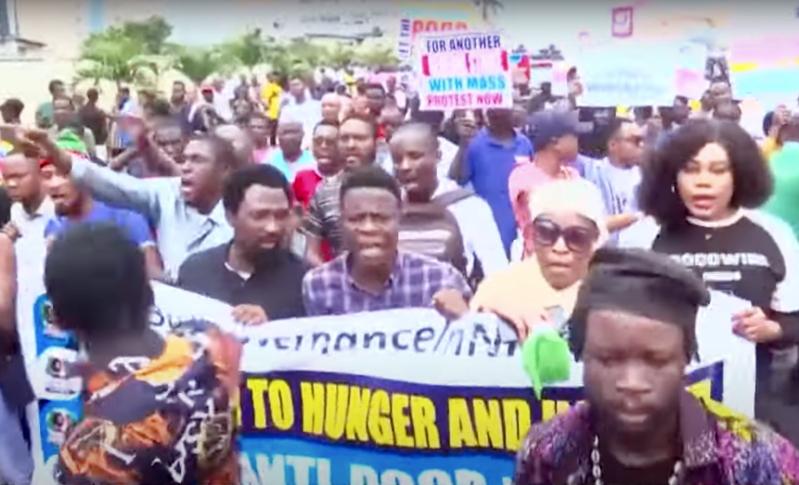
Beginning on August 1, Young Nigerians made good their intentions to protest against the high cost of living and bad governance as large crowds turned up for the nationwide protests organized by human rights organizations and students’ unions in the populous country.
The protests were scheduled to continue for 10 days ending on August 10, said the organizers. The public outcry in Nigeria comes a month after a series of protests in Kenya that started on June 25 led and organized by the youth that saw the government drop the controversial tax-raising Finance Bill 2024 bill in response to demands by the protesters.
Major cities like Abuja, Benin, Enugu, Jos, Kaduna, Kano, Ibadan, Lagos, and Port Harcourt, were completely shut down as activities in public and private institutions were brought to a halt.
Transport was paralyzed in most cities as demonstrators occupied major highways and city roads. In Kano, the governor announced a curfew after the protests turned into looting sprees blamed on ‘thugs that hijacked’ the largely peaceful demonstrations.
A section of Christian leaders had in July joined politicians and government officials in persuading the youth and church members to call off the planned protests.
The leadership of the Christian Association of Nigeria (CAN), in a statement posted on 25 July, called for peaceful protests and demanded that the Nigerian government listen to the cries of the people and “make efforts to implement humane economic policies that will ameliorate the people’s hardships.”
“We recognize and deeply empathize with the pain, anger, and frustration that many of our fellow Nigerians are experiencing. The cries of the people underscore the severe difficulties faced daily as families struggle to afford basic necessities and sustain their livelihoods,” said CAN President, Archbishop Daniel Okoh.
The association urged Nigerians to consider alternative means of expressing their grievances and recommended that the protests be postponed to give the government more time to address the concerns. Five days before the protests, the government had announced jobs for young Nigerians in the state-owned oil company and a $70 million youth investment fund to discourage Nigerians from going to the streets.
However, other church leaders joined the demonstrators in demanding transparency and an end to endemic corruption. In the city of Jos in Plateau State, Central Nigeria, the protest was led by Rev. Isa El-Buba, President of Evangelical Bible Outreach Ministries International (EBOMI). Rev. El-Buba said his involvement in the protest is, “to demand for godly leadership, probity, accountability, and an end to bad governance in the country.”
Other church organizations added their voice to the public discourse on the difficult economic challenges that has seen inflation rise to a 28-year high of 34.2%. Christian denominational leaders of Evangelical Church Winning All (ECWA), the Church of Christ In Nations (COCIN), Anglican Communion, and the Methodist Church called for peaceful protests and urged the Nigerian government to govern the nation through righteous leadership.
The Church of Christ In Nations equally discouraged its members from participating in the protests although it acknowledged the need for the government to address the grievances.
“Anger in the hearts of Nigerians is justifiable because they have the right to be cared for and treated better, but anger has to be constructive to breed something better than death. From experience in the past, peaceful protests have never been peaceful. May the Lord give us the grace to forgive and endure, may we also take time to listen to the underlying message in this hardship that has been constructed for us in the midst of plenty,” said Rev. Dr. Amos Mohzo, President of COCIN.
Dr Oliver Ali Aba, the Prelate of the Methodist Church in Nigeria, on behalf of the leadership of the church said: “The Council of Bishops of the Methodist Church in Nigeria expresses alarm at the high rate of unemployment among young people, which is linked to various social vices. We therefore, call on the Nigerian government to step up its efforts to address the worsening insecurity in the country and end bad governance.”
Rev. Ibrahim Kassim, the public relations officer of ECWA, in a statement on behalf of the ECWA Church leadership said while protests are part of the tenets of democracy, there were fears that there might be some people who may hijack the process and push the country into chaos and instability.
“We are all aware that protests can take different dimensions as witnessed during the EndSARS protest when hoodlums infiltrated the protesters and wrecked serious havoc that led to the loss of many lives and properties,” said Kassim who dissuaded church members not to participate in the protests.
The 2020 EndSARS protests led to several deaths after demonstrating Nigerians clashed with the police. The protesters had demanded the disbandment of a brutal special police force known as the Special Anti-Robbery Squad (SARS).





